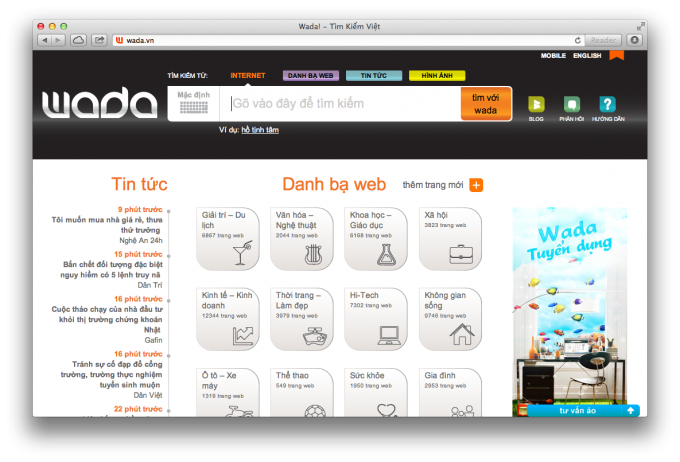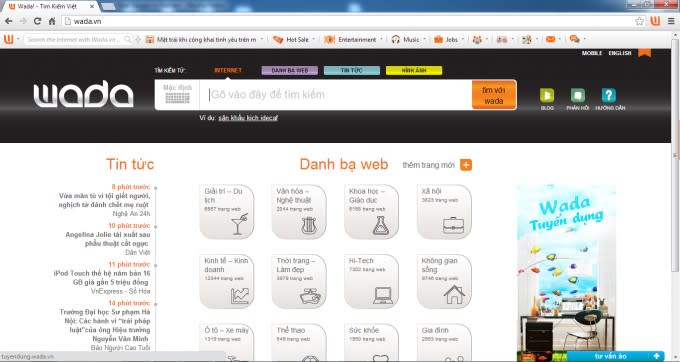Wada Will Spend $15 Million in 2013 to Beat Google in Vietnam

We’ve been hearing a lot from Vietnamese search engine CocCoc lately, especially with our recent meetup and interesting news about its planned $100 million strategy in the next decade. So I wanted to take a look at Wada, CocCoc’s other big competitor in this space. Not to be outdone by CocCoc, Wada has already spent $10 million in the past year in building its search product and acquiring people. Not only that, they’re also backed by Russian investors like CocCoc. Thus, it’s an interesting battlefield we’re seeing in Vietnam’s search landscape. CocCoc and Wada, the Russian-backed Vietnamese search engines, all seeking to topple Google’s statue. Oh wait a minute, isn’t Sergey Brin’s family from Russia as well?
Wada, unlike CocCoc, is going for a mobile strategy. After all, CEO Pham Tien Thinh, whose background is in telecoms, and Vo Dinh Bao Quoc, Wada’s CMO, both have a background in mobile. This interestingly puts them in a space that they hope CocCoc and Google are both not competing in. But the differences don’t stop there. Let’s look at some numbers and Wada’s history first.
Wada’s been in development for a year now and officially launched seven months ago. The team currently consists of 45 full-time and 70 part-timers. In February it launched a mobile search function in beta, with a full scale release set for next month. That’s when they’ll also be releasing Android and iOS apps along with a mobile browser. They also have a cool app called Wada Wifi Map. Aside from these mobile beginnings, Wada also produces a toolbar that works on Internet Explorer, Chrome, and Firefox browsers that curates content for users.
Wada’s search into location
As Thinh says “We seek to co-exist with Google, and don’t compete with Google.” What this means in terms of strategy is that Wada is attacking ad markets and content streams where Google is not. An example that Thinh loves to cite is pawn shops. If you’ve lived in Vietnam, you’ll know that pawn shops are pretty commonplace and people need to find them to exchange their goods for money and vice versa. This is a category that Google doesn’t cover. The same is true for finding an ATM. Wada buys all this location data from a local third-party provider and then crawls it themselves. Thinh believes this provides for a more local and up to date data set. It also allows them to be stronger in the countryside where Google and CocCoc may still be weak as their data would be centered in the cities.
In fact, much of Wada’s data is curated by humans instead of algorithms. According to Thinh:
Currently, the data in Vietnam is quite weak and Google isn’t local enough to know what Vietnamese people want. For example, I need to know where to wash my motorbike, not my car. So what we do is we meet users and find out what they want. From there, we have a database of about 50,000 websites that we think are the most popular sites in Vietnam. We push the most relevant ones to users. In the future, maybe by next year, we’ll start employing more technical solutions like algorithms but we need to organize enough data first before then and Vietnam’s content is still weak.

Within this curated content strategy is Wada’s Toolbar.
The Wada toolbar
Wada’s browser toolbar (currently only available on Windows), which was released in April, already gets 1.3 million users per month, has been downloaded 600,000 times and has generated 3.9 million page-views via the bar. That’s some pretty fast growth for a toolbar. The key with the toolbar has been identifying what Vietnamese users want most and pushing the best websites for that on the toolbar. For example, if you want to find a restaurant, the Wada bar will direct you to sites like Foody.vn or PartyinSaigon.com. These are sites that Wada has identified as best for users.
 |  |
The Wada Wifi Map app
Another interesting product Wada has released is the Wada Wifi Map. Basically, the app has a database of wifi hotspots across the city and allows users to add data to each wifi hotspot location. Thus, I could go to a coffee shop, check the Wada Wifi Map, and find out the password for that wifi spot without even needing to ask the waitress. Thus, it suits a need that Foursquare sometimes addresses for users but not completely. It also gets the Wada brand on more mobiles.
At the heart of Wada: news and mobile ads
But aside from the localized location database, mobile browser, the toolbar, and wifi app, the key source of income and central strategy is their news platform and ad network. As Thinh says:
We see Wada as straddling two very significant worlds online: the users and the advertisers. So that’s why we’ve developed a 4C model: Contextual advertising, Connex (i.e. the news aggregation service), Creatif (the toolbar), and Cell (the mobile offerings like wifi map app). And this all relates to how we are treating news data especially. Today, 92 percent of Vietnamese people online use search. And 91 percent of them are online to read the news. So this is where our concept of teasers and pushing content to publishers comes in.
Teasers, according to Thinh, are snippets of an article that are meant to entice a reader to read more. These teasers would show up next to the content on what the reader is seeing and are clickable, leading to Wada Connex, a page that basically aggregates a bunch of similar content for the reader. This allows Wada to promote publishers in their network as well as push relevant content to users.
On the other side of this, if users have Wada’s toolbar installed, Wada will crawl the current page a user is on, and serve ads onto the bottom of that page. Thinh says that they will only push ads that are relevant to the user, like if you are searching for iPads, Wada will push iPad ads to you. I took a look at the ads, and they’re bigger than Google’s Adwords, but have pictures and prices.
Wada is also working on getting its targeted ads on mobile apps from local developers. Thinh says this means they’re very supportive of mobile developers because they want them to succeed so that they can deliver their ads on them. In fact, Wada also has its own app store, where it has exclusive deals with app developers to serve up ads instead of charging for the app. All of this is in keeping with Thinh’s thoughts:
In 2011 and 2012, online advertising was dominated by banner and display ads. Up to 85 percent! So at Wada, we want to bring up the level of contextual and targeted ads in the online space.
Spending and investment
Lots of people in Vietnam’s tech scene have been lauding over how much CocCoc is spending on their search business, and so far they’ve already spent $17 million. Wada’s spending also hasn’t been conservative. Last year, they spent $10 million, and in 2013, they’re on course to spend $13 to 15 million. Their investors include Ashmanove & Partners, Kusto Group, and Finam Global. All Russian investors keen on growing the technology sector in Vietnam.
2013’s battle between CocCoc, Google, and Wada
By the end of this year, we’ll see CocCoc and Wada revving up their efforts in dominating the Vietnamese search market. Both have significant financial backers and believe strongly in their own strategies that will supposedly overcome what past Vietnamese search engines failed at. With CocCoc competing head on in web and web browsers and Wada heading into mobile, it’ll be interesting if they can etch out new fiefdoms in the search market. I think they’re still both competing heavily with Google, since Google is everywhere, so localizing will certainly be key to winning. But is it enough? We’ll see.
The post Wada Will Spend $15 Million in 2013 to Beat Google in Vietnam appeared first on Tech in Asia.


